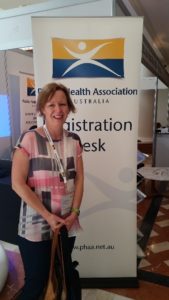
I was honoured to be awarded the PHAA SA Konrad Jamrozik Student Scholarship to attend the 2018 Australian Public Health Conference in Cairns. The conference theme was ‘Leadership in public health: Challenges for local and planetary communities’. As a PhD student half way through my candidature, this theme appealed to me on several levels. My research focusses on organisational capacity for evidence-informed public health policy and planning, of which leadership and governance are key elements. Also on a more personal level this theme resonated, as an early-career researcher, fuming with frustration at the current state of political leadership, and brimming with enthusiasm to make the world a better place – isn’t that why we’re all in this? So I headed off to sunny Cairns with a heady mix of excitement and acute imposter syndrome – a common malady among PhD students I’m assured!
The first day got off to a great start, with excellent plenaries led by Chris Barrie, who shared my frustrations about failed institutions and leadership in Australia. Linda Selvey inspired with calls to challenge our assumptions about who can lead, to unite voices, listen to each other and harness the power of those not usually listened to, in order to “swim against the tide” and challenge big problems like obesity and climate change that will require paradigm change. Carmen Parter reminded us that “culture is life for Indigenous Australians” and questioned whether policy makers ‘get it’ – to do so requires that they understand the history of colonisation and the destruction/removal of culture. We need leadership to ensure understanding around Indigenous culture and putting that into practice. The Basil Hetzel Oration delivered by Rohan Greenland capped off a brilliant first day, reflecting on the ‘muddling through’ nature of policy making, while empathising somewhat with the lot of health ministers, and calling for a dedicated national preventive health agency, greater government accountability for decision making, and proposing a sustainable funding system for preventive health.
A couple of things that stood out for me were a Victorian project to support rural GPs in providing medical abortions – a clear unmet need in rural communities. Also some research on ED presentations in Cairns – of great interest to me having previously worked on after hours primary health care needs assessment research. I was intrigued by the use of ‘Tea-bacco’ among prisoners. With my head spinning with new information, the final ‘Rapid Fire’ session gave a fantastic example of public health leadership and persistence on the long road to achieving a minimum floor price on alcohol in the Northern Territory, a technically small, yet politically challenging change that will have enormous benefit, and was rightly met with vigorous applause from the audience.
The later plenaries in the conference had a focus on the frightening and urgent challenges of climate change. As an enthusiastic recycling, composting, Prius-driving ‘greenie’, this came as no great surprise to me, but the pertinence of these impacts seemed all the more immediate in the far north of Australia, where tropical diseases are an ever-increasing challenge, and Pacific Island neighbours are and will increasingly be hardest-hit by disastrous impacts of climate change. I came away with mixed emotions – a sense of dread at what seems like the inevitability of catastrophic, far reaching environmental, political, health and social impacts of climate change. But I am also inspired with a sense of hope, from the outstanding leaders that I have been privileged to learn from over the course of this conference, and from the emerging leaders, who are tackling issues locally and globally. I am also encouraged and empowered, overcoming my imposter-syndrome, that I am, and we can all be, leaders for public health.

